- Home
- S. E. Lynes
Mother
Mother Read online
Mother
A dark psychological thriller with a breathtaking twist
S.E. Lynes
For Mum
The past is not a package one can lay away.
Emily Dickinson
Contents
Good Friday, 17 April 1981
Chapter 1
Chapter 2
Chapter 3
Chapter 4
Chapter 5
Chapter 6
Chapter 7
Chapter 8
Chapter 9
Chapter 10
Chapter 11
Chapter 12
Chapter 13
Chapter 14
Chapter 15
Chapter 16
Chapter 17
Chapter 18
Chapter 19
Chapter 20
Chapter 21
Chapter 22
Chapter 23
Chapter 24
Chapter 25
Chapter 26
Chapter 27
Chapter 28
Chapter 29
Chapter 30
Hear More from S.E. Lynes
Also by S.E. Lynes
A Letter from S.E. Lynes
Acknowledgements
Good Friday, 17 April 1981
Still the man thrashes against him, wild as a trapped animal. His arms flail; his shoes scuff against the damp gravel of the canalside. His feet gain purchase. His legs lock. His rigid torso thrusts into Billy’s chest. It’s a powerful blow and Billy staggers backwards at its force. They’ll both end up in the water at this rate, he thinks. But he must keep tight hold of the rope. This is his very life he’s holding onto; he’s come this far and nothing will make him let go now.
The man writhes, cries out – choked, desperate. He clutches at the rope to try to prise it from his failing throat. The twine chafes against Billy’s knuckles, sends blood slick across his aching white fists. The man gives a guttural cough, an internal retching that seems to come from Billy’s own chest. Together they lurch, wrestling twins, a two-headed beast, until the man’s scrabbling boots blanch under the street light. Billy freezes. They have left the cover of the bridge. Someone might see.
With a roar, he drags his raging victim back to the dark, heels scoring twin trails in the loose stone chippings until, to his relief, the shadow of the bridge slides over them once again. Billy’s nostrils flare; his mouth gapes. Not enough air; he must suck in all he can. Overhead comes the rubbery rhythm of cheap shoe soles on stone. One person only – the brisk, offended strut of a good-time girl who has heard one joke too many tonight. Soon there will be more people along this way. He must hurry.
The man bucks, his belly rounding like a bedsheet on the breeze. With all his strength, Billy pulls the rope. He has begun to cry, to sob with a kind of grief. It is all so wretched, but he has not been able to grasp the exact nature of the wretchedness until now. This is how it is to kill a man. This is how it feels.
His body is numbing with cold and pain. His nose is running; no hands free, he has to lick away the gritty trail of mucus from his upper lip. His wet hair falls into his left eye. He flicks his head to clear it, but it falls back. He blows it up, this stubborn lock, but it drops again as soon as his breath fails. It is so bloody awful, this business of death. It wasn’t meant to be this hard. It wasn’t meant to be this messy.
He yanks at the rope again, and this time, at last, the writhing stops. Billy could let go of the rope now, but no, it is not worth the risk. He will finish this, and after it is over, then will be the time for putting things right. Then will be the time for atonement.
‘I will do only good.’ His voice is little more than a croak; his biceps sear for lack of oxygen. ‘Only good from now on. I swear by Almighty God.’
He gives one last pull. The rope is in spasm, his hands in spasm with it. His teeth hurt; he fears he might press them into his gums. He cannot hold on.
The tang of urine fills his nostrils. The man collapses. His feet splay, his body heavy as a gravestone. Silence rushes under the bridge and stops there, filling the space with its terrible sound. Billy clutches the rope, but already the tension is gone.
‘Only good now,’ he says, and falls to his knees. ‘Only good from now on. Oh God.’
Footsteps overhead: clack, clack, clack – the whinny of tipsy female; the bass notes of the male who thinks his luck is in. Billy’s chest is a pump. The jagged path digs into his knees. If those above could see him here below: filthy and crying, snot-smeared and pitiful. What foul troll is that? they would ask themselves. What monster?
He sucks at the cold damp air, air that smells of moss and dirt. Monster. With his bloody hands he wipes his face but feels only mud and grit. Monster. He is still weeping: for this death, for his own saved life. If they could see him, if anyone could, oh God.
The pain of the evening’s exertions claws at his bones. He must rally. He hauls himself to his feet, tries to lift the body, but it is too heavy. He has to kneel again and push with all his remaining strength to roll it towards the water. It now. At the edge, he stops. He can feel the ugly set of his own disgusted mouth. His skin itches and cracks. He closes his eyes for a moment. He is already kneeling, as if the decision to pray has been made for him.
‘Lord God,’ he whispers, closing his hands together, hoping he can remember at least some of the words. ‘As we commit the earthly remains of our brother to the earth… that is, to the water, grant him peace until he is raised to the glory of new life promised in the waters of baptism. We ask this through Christ our Lord. Amen.’
A strong shove is all it takes to roll the body over the side. Barely half a second passes before the dull splash of oblivion breaks the quiet. Billy groans, lies full length on his stomach and stretches his hands into the water. Scooping up handfuls, he splashes his face clean. Baptism, he thinks. I baptise myself. I am born again.
Chapter One
12 June 1981
What I want to say before we start is that I loved him. I loved him. And he loved me.
There. I can begin.
Write it all down, they tell us in here. Writing is therapy. They had to say that. I haven’t spoken since I got here. I suppose writing’s a bit like confession, isn’t it? Head bent to the desk as behind the grate – bless me, Father, for I have sinned. But today, sitting here covered in shame and regret, I know that nothing I can write will change what happened. All I can hope for is that it will change how I feel about it. I’m not looking for forgiveness. I am beyond forgiveness. I’m looking for understanding. Peace, maybe, maybe not. I’m certainly not holding my breath for a full night’s sleep, a meal I can finish, a packet of pills I can toss into the bin. But I no longer have the heart to pray, so I suppose writing it all down is better than doing nothing. What I don’t know for certain, I will imagine, but what I imagine will be within reason, given everything he told me at the time – everything I believed at the time.
‘I’d always known,’ he used to say. He would say this often. ‘Even before they told me. Even before I could put it into words, I’d always known.’
I would take his hand in mine. His hands were pale, with soft tufts of dark hair on the backs of his long fingers. Pianist’s fingers, I’d call them, though he didn’t play.
‘It’s nothing to be ashamed of,’ I told him. ‘It wasn’t your fault.’
I used to think listening was a privilege – to have another person entrust to you their darkest secrets, their vulnerabilities, the private insanities we all have. There’s an intimacy that comes with that. Love comes with that. It could be that love is not possible without it. I don’t see listening that way any more obviously. But what choice did I have? He came to me; he trusted me – what else could I do? Once he’d started, I saw the momentum gather wi
thin him like a blackening cloud. And then, my God, the words fell like rain. Slowly, then faster: a million beaded droplets in the longest, heaviest downpour.
And I took that sodden weight from him with love.
‘It’s OK,’ I told him.
But it was not. It was not OK.
I remember once he told me about how, as a boy, he used to run the hot water into the sink in the bathroom, let the steam cloud the mirror and watch himself disappear.
‘I used to stand back,’ he said, his brow furrowing at the memory. ‘I’d screw my eyes up to see if I could get myself to come into focus.’
Anxious then – though of course he’d sought his own anxiety – he would wipe the wet fog from the mirror with his pyjama sleeve, sigh with relief at the sight: him, himself, Christopher Harris.
‘A normal boy in a normal bathroom,’ he’d say. ‘In a normal semi-detached house in a normal street in a normal seaside town. And Christopher, well, that’s about as normal a name as any, isn’t it? Did I tell you I was named after St Christopher?’
He was so particular about his name. Christopher, not Chris, please, he would correct, in that quiet voice of his, anyone who attempted to abbreviate him. Not that he was the type to make a fuss, but as he always said, Names are important, aren’t they? They tell you who you are.
His hesitant smile, his brown eyes meeting mine. He was looking for himself there, I realise now. He was always looking for himself.
* * *
And then there was the rope.
That was how he described the knot he’d carried in his chest ever since he could remember – a knot that, no matter how often he picked at it, would never loosen. The knot persisted throughout his childhood, into his teens: a tight confusion of endless loops, without beginning without middle without end. Ironic, then, that as a young lad he loved to skip. He never made it into the football team, you see, and his parents weren’t ones for physical exercise for its own sake.
And so, alone on the back patio in the evenings, he would jump over the skipping rope his father had made for him, the wooden handles worn smooth by the long hours’ gripping. At night, he would unscrew those wooden handles, untie the knots within and slide the handles from the cord. In the dull yellow glow of his bedside lamp, he would make the figure of eight, the midshipman’s hitch, the fishermen’s bend – tongue out, eyes flicking every now and then to the pages of his Knots You Need to Know book, a tenth birthday present from his parents. I wonder if he thought about all this as he crossed and slid the braid through his fingers, as he pulled the cord tight. Could he almost hear the step, whip, step, whip, the whoosh of revolutions in the close air of the yard, the refrain he would repeat in breathless, half-swallowed words: salt, mustard, vinegar, pepper, salt, mustard, vinegar…?
I have so many questions and this is one: if it weren’t for the maintenance grant, would Christopher ever have untangled the rope? If it weren’t for the grant, he would never have gone to university in the first place; his parents could never have afforded it. Were it not for the grant, he would not have found the suitcase in the dark loft space at the back of his attic room.
But he did. Hidden behind the smarter cases his family used for holidays, Christopher, being Christopher, took this dilapidated, dusty old thing, not wanting to use the more decent luggage for himself. When he pulled the case towards him, the catch popped. The lid sprang open. Inside, a greyish blanket no more than a yard square and knitted in a cross-hatch design. It smelled strongly of mothballs, of dust. As he gathered it up from the case, a piece of paper flew out. He picked it up and opened it.
St Matthew’s Convent
Church Road
Railton
Liverpool L25
13 March 1959
Dear Mr and Mrs Harris,
We write to inform you of a baby boy, born only yesterday…
He dropped the torch and fell back, fingers sinking into the itchy pink insulation strips that ran between the ceiling joists. The thirteenth of March. The day after his birthday.
In the dark, cramped space, the fallen torch shone a spotlight on the brick wall: cobwebbed, damp, crumbling.
* * *
He was born on 12 March 1959 – in Morecambe, Lancashire, so he had believed. His parents had never told him otherwise. Not that Jack and Margaret Harris were bad people. They were what you’d call traditional, but like all parents, they did their best. Don’t we all? Christopher’s treatment hardly marked him out as in any way special, not at that time. I want doesn’t get. Because I say so. Don’t come back till teatime. Phrases you would hear ten times a day. And like most kids, his backside was no stranger to the palm of his father’s hand, his ears more than accustomed to irritated quips from his harried mother. Stop fidgeting, for goodness’ sake, hold your fork properly, you can’t go to Mass dressed like that.
He was an only child until the new baby came in the winter of 1967. Perry Como on the Dansette, ice on the inside of his bedroom window. Hooked over the Kodak Brownie in the lounge, his father snapped his mother’s belly, huge and round under its patchwork cheesecloth smock.
‘Don’t take any more, Jack,’ she said, shooing him away with her hand. ‘You’ll waste the film.’
Christopher thought she meant to save some for him, perhaps for the Scalextric track he’d built by himself in his room. But she didn’t come to see it, and his dad didn’t bring the camera out again until the baby was born – which happened a week or two later. That night, midnight-ish, he shivered on the bottom stair while from the front bedroom there came a cavernous lowing he could not equate with his mother. He dared not go up to see if she was all right – could not imagine what he would see if he did.
After what seemed like hours, his father came clattering down the stairs in his pyjamas. ‘I have to phone for an ambulance, son.’
From the blue Wedgwood dish on the hall table he dug pennies and ha’pennies, closed his fingers around them before grabbing his overcoat and throwing open the front door. He turned back, raised his forefinger as if in afterthought and said, ‘Wait there and don’t bloody move.’
The door slammed shut. Long minutes passed. Christopher did not bloody move. Then the key, crunching into the Yale. The front door swung open, a blast of cold air, his father’s eyes bloodshot and wild.
‘Right, lad.’ His sandy hair flew in one piece from his balding head like the top of a boiled eggshell. ‘Ambulance’ll be here in a bit.’
The ambulancemen carried his mother downstairs, one at each side of her, as if she were a chair and they were trying to keep the wallpaper from scuffing. They puffed with the effort. She was still mooing, and he thought of the Friesian cows in the field next to last year’s holiday cottage in Ffos-y-ffin. Her face was pink as raspberry jelly, her matted hair darkened to the colour of brown paper, stuck in pointed fronds to her glistening forehead.
‘Mum,’ he called out to her as they carried her into the street. ‘Mummy.’
But she was panting and moaning, and she did not look at him.
The next morning, his mother was not at home. There were no fresh socks, so he put on yesterday’s, and at breakfast his father did not put butter or jam on Christopher’s toast.
‘You’re eight, aren’t you?’ he said, eyeing Christopher’s knife stilled in mid-air. ‘Should know how to put butter on toast by now.’
That afternoon, Mrs Whiteside, the lady from next door, picked him up from school along with her own little boy, whose name he had forgotten by the time he came to tell me all this. She gave them both a jam sandwich and a glass of milk in her back kitchen.
‘Do you know where my mum is?’ he asked her.
‘Your dad’s with her,’ she said, taking his plate before he’d finished his sandwich. ‘Now off you go, the two of you – get out from under my feet while I peel these spuds. I suppose I’ll have to do extra.’
He was playing marbles with the neighbour’s son after tea when the long shadow of his father darkened the rungs
of their filthy doormat pitch.
‘A boy.’ His father’s silhouette, so much stockier than the shadow, eclipsed the light. His face was invisible. ‘Do you hear me, Christopher? You’ve a brother now. He’s called Jack.’
‘OK.’ Christopher returned to his game, pressing his knuckle to a cat’s eye the size of a gobstopper, a silver and blue ripple frozen inside its heavy glass. An important shot this. They were playing keepsies.
It would be years before he thought about the fact that his brother’s Christian name was the same as his father’s.
* * *
Louise came a year later. She and Jack Junior were their own unit: Irish twins, his dad called them. Their fair hair and bright, freckled faces did not match Christopher’s own black locks, his pale skin.
‘I was the blank canvas,’ he said to me once. ‘They were the works of art.’
‘No, no,’ I remember replying. ‘Don’t say that. You’re my work of art. We’re all a work of art for someone who loves us.’
But his siblings’ easy way with their mother – the way they climbed onto her lap if she ever sat down, hid under her skirt while she gossiped with the neighbours on the street, laughed when she scolded them – served only to remind him of his own stiff stance, his inability simply to hold, or be held by, another human being.

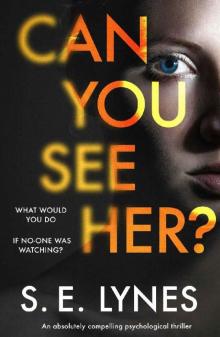 Can You See Her?: An absolutely compelling psychological thriller
Can You See Her?: An absolutely compelling psychological thriller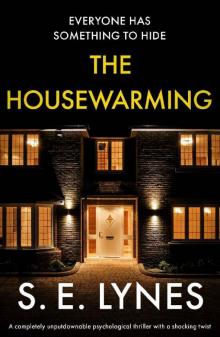 The Housewarming: A completely unputdownable psychological thriller with a shocking twist
The Housewarming: A completely unputdownable psychological thriller with a shocking twist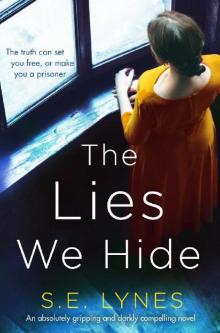 The Lies We Hide: An absolutely gripping and darkly compelling novel
The Lies We Hide: An absolutely gripping and darkly compelling novel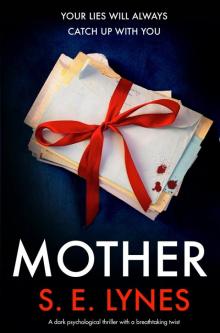 Mother
Mother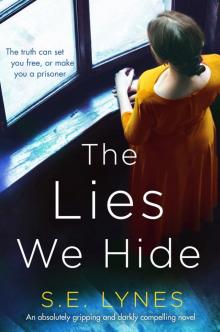 The Lies We Hide (ARC)
The Lies We Hide (ARC)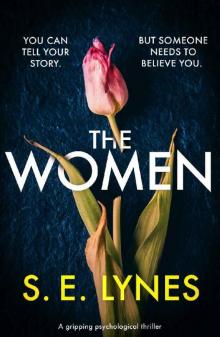 The Women: A gripping psychological thriller
The Women: A gripping psychological thriller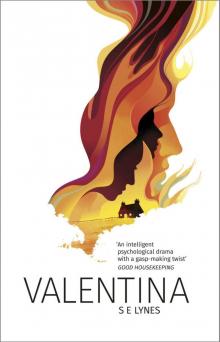 Valentina
Valentina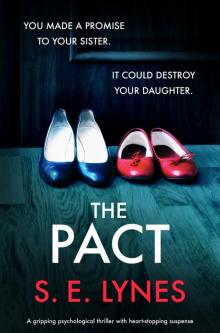 The Pact_A gripping psychological thriller with heart-stopping suspense
The Pact_A gripping psychological thriller with heart-stopping suspense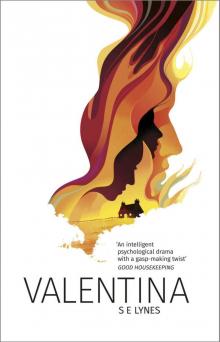 Valentina: A Hauntingly Intelligent Psychological Thriller
Valentina: A Hauntingly Intelligent Psychological Thriller